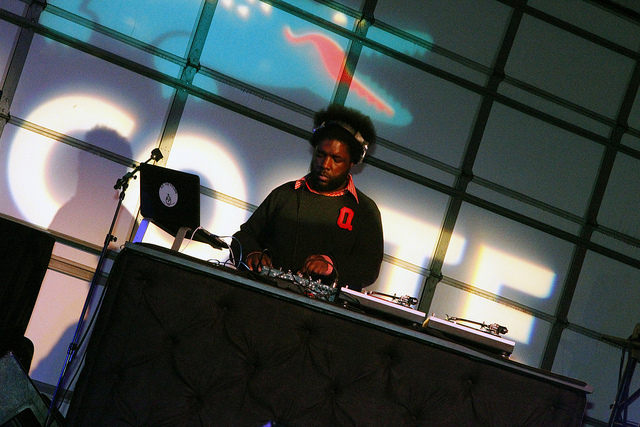Hip-hop hit a milestone this week, turning 40 years old. The same week, federal district court Judge Shira Scheindlin, in a 195-page ruling, declared the New York Police Department’s practice of stop-and-frisk unconstitutional. Hip-hop and stop-and-frisk are central aspects of the lives of millions of people, especially black and Latino youths.
Ahmir Thompson was just two years old when hip-hop got its start in 1973, but already had shown his talent for music. Thompson is now known professionally as Questlove, an accomplished musician and producer, music director and drummer for the Grammy Award-winning hip-hop band the Roots, which is the house band on the NBC show Late Night with Jimmy Fallon. He and the Roots soon will move with Fallon to the even more popular The Tonight Show.
Despite his success, Questlove confronts racism in his daily life. But he has built a platform, a following, which he uses to challenge the status quo — like stop-and-frisk.
“There’s nothing like the first time that a gun is held on you,” Questlove told me. He was recalling the first time he was subjected to a stop-and-frisk:
“I was coming home from teen Bible study on a Friday night … And we were driving home, and then, seconds later, on Washington Avenue in Philly, cops stopped us … I just remember the protocol. I remember my father telling me, ‘If you’re ever in this position, you’re to slowly keep your hands up.'”
A quarter of a century later, just a few weeks ago, Questlove was heading home to Manhattan from Brooklyn after a weekly DJ gig. He was pulled over by the NYPD. He told me:
“They walked up, asked to see license and registration. And it was like four of them with flashlights everywhere … They wanted to know, ‘Are you in a cab? Is this a cab? Where’s your New York taxi license?’ I have my own car, and I have my own driver.”
He felt they were treating him like a drug don. He showed them his newly released memoir, Mo’ Meta Blues: The World According to Questlove, with its stylized, psychedelic portrait of him on the cover.
“They looked, and they kind of had a meeting for five minutes. And then, it was like, ‘Oh, OK, you can go.’ But this happens all the time.”
As when Questlove was campaigning for Obama with Jurnee Smollett, an actor on the hit vampire show, True Blood. He had bought a housewarming gift for his manager, and pulled over the car to take a phone call. He described what followed:
“So I pulled over, talked, finished the conversation. Five cars stopped us, and pretty much that was the most humiliating experience, because, we had to get out the car. They made us spread on the car … [Jurnee’s] like, ‘This is unconstitutional! They’re not … this is an illegal search.'”
But search they did. The next night, he and The Roots won another Grammy.
Between 2002 and 2012, the NYPD conducted more than 4.8 million stop-and-frisks. More than 80 per cent of those targeted were black or Latino. Judge Sheindlin, in her decision, specifically criticized New York’s billionaire mayor, Michael Bloomberg, and his police commissioner, Ray Kelly. Kelly, who is said to be a candidate for Obama’s next secretary of Homeland Security, said:
“What I find most disturbing and offensive about this decision is the notion that the NYPD engages in racial profiling.”
I asked Questlove, with all he’s accomplished, what he is most proud of, and what he still hopes to do.
“I’m extremely grateful to have survived — literally just survived, because, you know, I’m still wondering: Will anyone in the hip-hop culture ever make it to 65? Will we have our first hip-hop senior citizen?”
The richest country in the world could and should inspire higher hopes than merely surviving. But for Ahmir “Questlove” Thompson and the hip-hop generation he represents, targeted by police policies like stop-and-frisk, it is no surprise. This is America in 2013.
Denis Moynihan contributed research to this column.
Amy Goodman is the host of Democracy Now!, a daily international TV/radio news hour airing on more than 1,000 stations in North America. She is the co-author of The Silenced Majority, a New York Times best-seller.
Photo: Daniel Incandela/flickr



